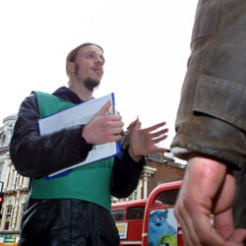The Institute of Fundraising is to host a summit about face-to-face fundraising as a technique, but has not invited or consulted the organisation tasked with regulating face-to-face.
The IoF yesterday announced that in light of media exposure of face-to-face fundraisers failing to meet standards it will hold a summit on the issue on 23 July. The Public Fundraising Regulatory Association, set up to regulate and enforce standards in face-to-face fundraising, has thus far not been invited to attend and was not involved in the summit’s planning.
The summit will look at how face-to-face is faring for charities, how charities feel about it and whether there needs to be any changes to the regulatory regime, or how the benefits of the technique is communicated to the public and decision-makers, to ensure its long-term health.
Peter Lewis, chief executive of the Institute, said the recent media coverage “has led to a wider debate about the value of face-to-face fundraising as a technique at all".
He said: “Now would seem a good time to take a step back, review the public’s experience of face-to-face fundraising, it’s financial importance to the sector and whether there are steps that we should be taking as the sector, or as the Institute, to ensure high standards are complied with and the public’s trust and confidence is maintained.”
Catherine Pusey, interim chief executive of the PFRA, confirmed that her organisation had not been involved in the planning of the event. “It hasn’t been done in a collaborative manner,” she said. “We are in conversation with the IoF and hope that we will be invited.”
Pusey defended the role and track record of the PFRA in monitoring and maintaining standards in face-to-face fundraising. “The PFRA was set up by charity members of the IoF to maintain and sustain public trust in face-to-face fundraising. Of our members the significant majority are charities that use face-to-face fundraising and we have a good track record of regulation. So to hold a summit with charities represented but without the PFRA seems to us to be likely to deliver an incomplete picture,” she said.
“We would be prepared to send a representative and the Institute is aware of that.”
The Institute’s Lewis told civilsociety.co.uk it is important to host the discussions among charities alone so as to allow full and frank discussions about the present state and future of face-to-face.
“It’s a first step in a process. It’s just us getting our members together to talk about it first and giving them some absolutely free space to do that,” he said. “To a certain extent the PFRA are a regulator, and when we discussed it with a few people they said they would prefer to have it just the charity fundraising directors to have a totally free and frank discussion. I’m sure at a later stage we will take it forward involving the PFRA and the FRSB.”
Lewis said that if the charity attendees agree, the PFRA and FRSB may be invited as observers to the summit.
Recent controversies
Face-to-face fundraising has, in recent years, typically inspired more column inches than other fundraising techniques, with recent scandals involving a Daily Telegraph expose about face-to-face training and behaviour which was in breach of the code of conduct, and another story which broke in recent weeks about fundraisers misleading donors about which charity they support.
At the PFRA’s own annual general meeting last month, head of standards and allocations Nick Henry admitted that the organisation has witnessed a drop in street fundraising standards over the past three years.
Earlier this year the PFRA delayed the implementation of a system of monetary fines for breaches of the code of practice on face-to-face fundraising on both the street and doorstep in order to accommodate the Institute’s plan to consolidate all its codes of practice into one.









